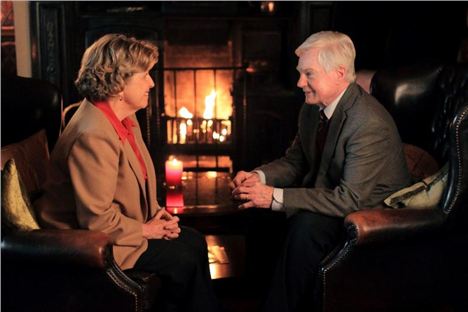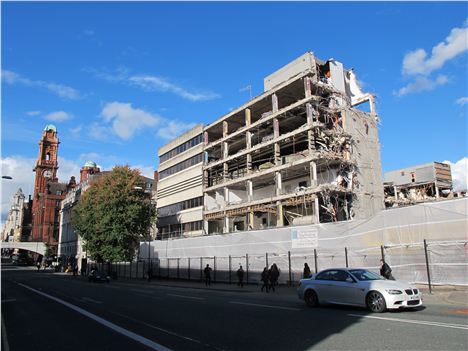THE Committee of Public Accounts, chaired by the right honourable Margaret Hodge MP, gave the BBC what initially seemed to be a huge vote of confidence. In an investigation into the corporation’s relocation to MediaCity, it was made clear that the BBC had done well to complete the move on time and on budget. It had managed the transfer of a lot of different programmes to a new facility whilst ensuring that audiences were unaffected.
The BBC was criticised for its ‘What’s ten million here and there?' attitude.
However, the move is not deemed to be an unqualified success and there are aspects of this glowing report that say ‘must try harder’. The first issue which was raised was that of capital expenditure – nearly a billion pounds over the lifetime of the project, a huge amount for a facility which only has a guaranteed life of 20 years. Although the move was managed well, there is a question mark over what will happen to the site in 20 years’ time.
The BBC was eager to downplay the amount by reiterating the fact that it was a sum that would be spent over the lifetime of the project but admitted it was a balancing act. Anthony Fry, BBC trustee, said: "It is clearly important for an organisation with the size, the scale and the reach of the BBC, to have appropriate facilities. It is also important that the underlying philosophy of moving the building, and moving that number of people to a different part of the country, away from metropolitan London, has sufficient scale to make it meaningful and not just tokenism."
Although smaller sites were considered, the BBC took the decision to move a greater number of staff, departments and programmes in order to have a real impact. They believe that this will prove to be the right thing to have done, both strategically and as regards value for money, although this is yet to be proven.
When making the original business case for the move to Salford, it was hoped to better serve the audience in the North, improve the quality of content, improve efficiency and provide regeneration benefits to the region. In its report, the National Audit Office recommended that the BBC trust should periodically review progress against these aims and Margaret Hodge was also tenacious in her criticism of the BBC’s lack of evaluation procedures. At the moment there is no evaluation framework in place, which she ridiculed, saying: "You have had since 2006 to dream one up and it’s not that complicated."
The BBC claimed that internal monitoring plans had demonstrated that the move better served northern audiences and that the viewing share gap between the North and South had halved in the past year, that is to say that northern viewers were watching more BBC television than previously. This was attributed to the making of more programmes in the North, such as the successful Last Tango In Halifax (although this was inadvertently named as the very different Last Tango In Paris, then hastily corrected). The committee argued that ratings fluctuate from one year to the next, and that it was too early to say that the BBC had been successful in reducing the viewing share gap.
Last Tango in Paris?
The BBC also shied away from one of its stated business aims, which was to provide regeneration benefits to the region by claiming that the BBC’s role was not to act as the economic regenerator of an area yet simultaneously claiming that the amount of activity taking place around MediaCity demonstrated that economic regeneration was taking place. Only ten per cent of the staff at Salford actually live there but there are no records of how many of the staff live in Greater Manchester. However, the BBC was clear in its commitment to the area, explaining its partnerships with local schools and its apprenticeships.
The second issue raised by the Committee of Public Accounts was the relocation packages paid to staff as part of the move to MediaCity. The NAO has already recommended that the BBC should ensure its recordkeeping is such that it is able to justify that the allowances are appropriate in all cases and that it should recover all relocation payments made to staff who then leave the BBC.
The relocation allowance, which lasts for two years and was a standard package for every member of staff, was strongly criticised because only 574 staff were relocated yet the money was paid to nearly 900 staff. The second figure relates to members of staff who applied for and competed for jobs at BBC North, knowing they would be based at Salford, yet were still paid a relocation allowance. This practice was described by the BBC as ‘standard’. £24 million was spent on the relocation of staff.
Peel Group, the BBC’s landlord, were also discussed by the committee. The BBC were asked whether or not they thought it was ethical to pay so much money to a company which only pays a maximum of ten per cent corporation tax in total – the most profitable parts of the business pay no UK tax, whilst the least profitable pay a little. The BBC defended the partnership, claiming that they followed EU procurement rules and that it wasn’t their job to take on the role of HM Revenue and Customs.
Margaret Hodge dismissed this, saying: "We’re not asking you to be HMRC, we’re just saying that when you’re using taxpayer’s money – the licence fee is a form of taxation – it ought to be with companies who pay their fair share into the communal pot. That’s all. It’s a very simple proposition. I get so fed up with people talking about EU procurement rules as an excuse. There is always a way of ensuring, within the way that you do procurement, that you have a company that behaves responsibly in relation to its payment of tax."
The fact that Peel Group investments make up a huge share in capital investment in the North West, raised questions as to whether the BBC’s contract with the company was as competitive as it could be.
The BBC was also slated for the sale of the old BBC building on Oxford Road which is currently a car park. Valued at £19.6 million at the height of the property market, the premises were sold off for only nine million, rather than waiting for an upturn in the market. The BBC was criticised for its "What’s ten million here and there?" attitude.
The BBC as it disappeared on Oxford Road
However, this ten million paled into insignificance compared to the hundred million pounds of taxpayers’ money which was blown on the failed Digital Media Initiative project which may well affect debate around the next Royal Charter.
The initiative, which is being investigated by both Price Waterhouse and the NAO, was recently scrapped. Bill Garrett, Head of Technology in the BBC’s production arm, repeatedly raised concerns about the project but his letters and his concerns were brushed aside.
Mark Thompson, the former Director General of the BBC, told the Committee of Public Accounts in 2011 that there were many programmes that were being made using DMI and some had even gone to air and that it was on track to be fully delivered that year. However, Garrett refuted Thompson’s assertions, claiming that in reality no programmes had ever been made using the technology despite two years having passed since Thompson’s evidence was given and he was worried that the House of Commons Committee of Public Accounts and the Department of Culture, Media and Sport had been misled.
After what seemed like a total savaging of some of the BBC’s business decisions and its management, the conclusion was very upbeat.
The BBC’s success in handling the move so well was praised. The positivity that bookended the meeting seemed to sit oddly with the criticisms inbetween.












